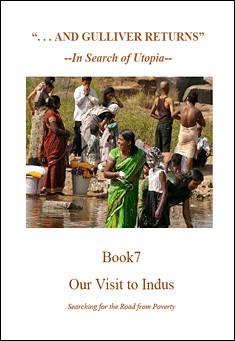Book 7: Our Visit to Indus.
Indus is on the Indian sub-continent. It is a developing nation with a population problem. However the societal leaders realize that when former Indian Prime Minister Indira Gandhi attempted to limit every family to two children in the 1960s she was voted out of office. Indus therefore has no laws on limiting parenting. So how can the people be manipulated to accept smaller families?
Excerpt:
Our drive, mainly on dirt roads, passed the makeshift slum houses--some with driftwood roofs, some with corrugated plastic and some with corrugated metal roofs. The monsoon season would soon visit with the vengeance of Shiva and the solid roofs would offer some protection from the sheets of water that the gods would dump from the sky to cool the 110 to 120 degree furnace that roasted and parched this ancient plain.
President Ghosh, the newly elected leader of this human hell, was genuinely concerned. He pointed out the landmarks more with pity than with pride. His concern was obvious and deep. And we shared his concern. Our lives are so blessed, and these hungry human skeletons scavenge for scraps to allow their malnourished bodies to survive until sunset. The accident of one’s geographical birthplace and how the cards are dealt in the parent-poker lottery determine 99.9% of our fates. kismet, karma, luck, predestination—it isn’t fair. But then as my grand dad said, ‘things are never fair.’ Our American bodies are well fed, some of our minds are well read, we hold the spark of a realistic hope for our futures, the feeling that if we have a dream—we can make it a reality. But what hope is there for these illiterate adults, what hope for their children? Do they care as much as we do whether tomorrow dawns. And will the dawn come up like thunder, as Kipling penned of our Asian neighbor, or will it merely slither in like the ever-present cobras bringing fear, despair and maybe an early demise?
I don’t think I’ve ever experienced such an energized epiphany that we are indeed brothers. So many of us hapless, hopeless, rootless--but so often the prisoners of our own decisions. So often jailed by our traditions. So often mired in the confinement of our helplessness. Do I have any hope of helping the helpless? Of feeding the starving? Of aiding the sick? It strikes me again that throwing dollars at the impoverished will give only a temporary respite. It may lengthen the life of an AIDS patient; give a year of schooling to some impoverished boys, and maybe a few girls; buy some mosquito nets to reduce the incidence of malaria; but will it make any difference in the reduction of poverty and illiteracy. Will it open the door to human happiness?












